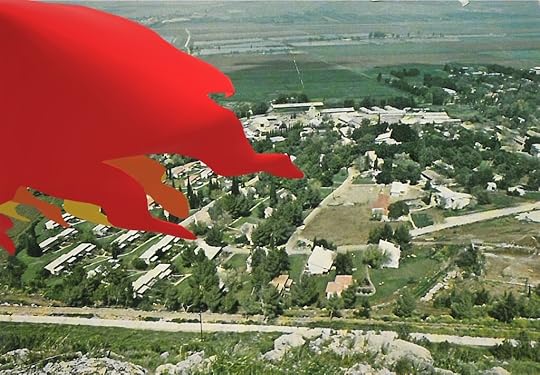The Kibbutz is Burning

An old short story, rewritten, reflecting so poignantly what’s taking place currently in Israel. First segment:
David stayed in bed, not fully awake yet from a terrible dream. He blamed the uneasy feeling growing inside him on that dream, and at the same time resisted a strange need to go back to it. He fought that urge, trying to concentrate instead on listening to the birds outside, a habit of his for many years. They were calling on him to join them, but he wasn’t in a hurry to get up. It was Shabbat morning, after all, and beside him his wife Rosa was still asleep, snoring softly. He delayed also going to the bathroom, though the pressure on his bladder was very heavy, as was the case often lately, at this time of the morning. He was afraid, most of all, that he might wake up his dear ones: his grandson, his son, and his wife. They were all asleep on the open couch in the adjacent living room; tired, no doubt, from the festivities of last night.
Yes, that was a real celebration, he reaffirmed to himself fondly. Sixty years ‘don’t go simply by foot,’ as today’s youth are so fond of saying. And as for the old, like himself, they should be proud of themselves for a day or two. Here, on the slope of the biblical Mount Gilboa, where King Saul and his son Jonathan had fought the Philistines, and where they heroically had died; here once only an infested swamp existed, but now stood proudly a beautiful, successful kibbutz.
This accomplishment was the basis and main theme of the colorful pageant performed last night at the new Community Center: The first days of Aliyah, the struggle and triumph that had followed in their footsteps, as the new Jewish immigrants conquered Eretz Israel. Of course, the presentation was done with the best that modern equipment
can offer these days, including audio-visual effects. And yet, it was the pure voice of the choir that had melted his heart so easily, singing those old Chalutzim songs. What a pity his son Gideon wasn’t among them; he always was such a fine singer. But that was before he’d got married and left the kibbutz. Before that city-girl of his had snatched him away from here for good.
A short cough came out of David inadvertently just then. He tried to strangle it but was too late. Rosa mumbled something first, then turned away from him and went back to sleep. He hoped his cough hadn’t woken up little Asaf: he needed the sleep, so he could grow up and be strong and healthy. And who knows, David thought wishfully, maybe one day his grandson would be the one to come back to the kibbutz.
He closed his eyes, trying to imagine such a favorable scenario. At the same time, the irresistible temptation, and warning too of that terrible dream came back to haunt him. It was possible, he couldn’t tell at first, that he did go back momentarily to visit the realm of that dream. Because suddenly—just as he felt how the mask of sleep was beginning to veil him yet again—he found himself in the bathroom, trying to relieve his urinary pressure. He stared at his bathtub while at it, trying to help things along by counting the tiles. Who would have believed back in the old days, he asked himself rhetorically, that one day we would have private bathtubs? What happened to the old Community Shower? And where are we heading, anyway, that we have homes with color televisions and landline telephones, and separate kitchens too with refrigerators and oven toasters? What will be the end of it all?
And suddenly—again, he was unsure how it’d happened so quickly—he found himself planted in the middle of his garden, wearing his black working shoes, his khaki shorts and gray undershirt. Apparently, he had drunk already his strong black coffee, and was ‘ready for wars,’ as his son had used to say. The kibbutz was still peacefully asleep. And why not, it deserved it after last night’s big celebration. Only he and the birds were awake. For them, it was a morning like any other morning: the Sixty-Year Anniversary of the kibbutz’s establishment meant nothing to them. The same could be said about Libi, his neighbor’s dog, a Border collie who kept running around his pecan tree for some reason. Right where his old, red bicycle was leaning on the trunk.
He stooped over his beloved daffodils, and despite the pain that was tormenting his lower back lately, began to methodically extract the wild weeds that were threatening to suffocate them. It was not so hard: only the crabgrass fought back, as it’d done for almost forty years now. It was a war without winners; it was a war without end. Like the war…
He straightened up abruptly, smelling smoke. His nose was especially sensitive to such smells, as Rosa his wife had pointed out not once. Yet he looked around and saw no sign of smoke, or fire for that matter. Not even a garbage barrel burning. The kibbutz was secure and serene as ever, and so was the mountain above it, with the Children Orchard nestled in the bosom of its slope. A pine tree for every child of the kibbutz was planted there, including for his own son and daughter. Luckily, Dalya was still living in the kibbutz. But how come she was yet to get married? Was yet to bear him grandchildren to play with, in his old age?
There was still hope, he believed, as he picked up the black hose and turned on the water. He placed his thumb on the mouth of the hose, so skillful at it, and created a perfect fan-shaped screen of silvery drops. He watered his garden with easy, steady moves, up and down, left and right. He always liked watering his garden this way, before the rainy season, as he expected, would begin in earnest. It made him feel alive, and so in tune with nature, especially when the soft morning breeze blew, as it did now, a few drops of water at his face. All his anxieties were gone by now, had been left behind in the house, in the bedroom, in the bed, in the dream. But then, just as he was raising the water hose high in order to reach the row of hawthorn bushes framing his garden, he thought he saw smoke rising from somewhere. He threw down the hose and grabbed his old, reliable wooden ladder. Next—and again, it was so fast he couldn’t understand how it’d happened—he was high on a branch of the pecan tree, together with the black ravens. He looked over the roofs and trees, far away towards the valley below and its flat brown and green fields, bordered by placid fishing ponds glistening in the morning sun. He then turned his eyes over to the plastic factory and the cowsheds, all the way to the main yard of the kibbutz. Where he saw—clearly, he didn’t need his binoculars—a column of black smoke rising.



